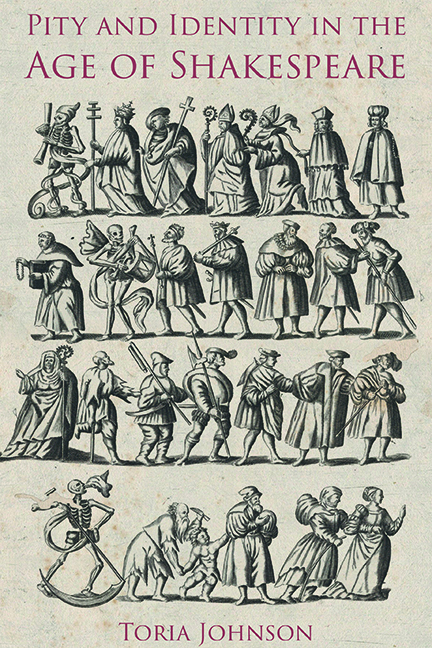Book contents
- Frontmatter
- Dedication
- Contents
- Acknowledgements
- Textual Note
- Introduction
- 1 ‘My name is Pity’: Mediated Emotion and King Lear
- 2 Violent Spectacle and Violent Feeling in Early Modern Lucrece Narratives
- 3 Dramatic Reworkings of Poetic Pity
- 4 Theorising Humanity Through Pity
- Conclusion
- Bibliography
- Index
- Miscellaneous Endmatter
4 - Theorising Humanity Through Pity
Published online by Cambridge University Press: 07 October 2022
- Frontmatter
- Dedication
- Contents
- Acknowledgements
- Textual Note
- Introduction
- 1 ‘My name is Pity’: Mediated Emotion and King Lear
- 2 Violent Spectacle and Violent Feeling in Early Modern Lucrece Narratives
- 3 Dramatic Reworkings of Poetic Pity
- 4 Theorising Humanity Through Pity
- Conclusion
- Bibliography
- Index
- Miscellaneous Endmatter
Summary
‘UNCAPABLE OF PITY, VOID AND EMPTY’
When, in The Merchant of Venice, the Duke describes Shylock to Antonio, he uses the language of pity and humanity to conjure the merchant's legal adversary:
DUKE
I am sorry for thee: thou art come to answer
A stony adversary, an inhuman wretch
uncapable of pity, void and empty
From any dram of mercy.
The Duke captures Shylock's character in terms of his absent qualities. Shylock is what he lacks; he is uncapable, void, and empty. The connected category assessment – that Shylock is inhuman – acts as a kind of shorthand for his emotional shortcomings. By this description, inhumanity is defined partially as a missing capacity for pity; an emotional ‘void’ and emptiness that is filled in for ‘full’ humans. As I have argued throughout this book, this framing of pity as a vital component of humanity – something fundamental to the human category – appears again and again in early modern English writing, and particularly in Shakespeare's dramatic work. That said, in The Merchant of Venice, it is easy to see that there is more at stake. The Duke uses pity (or rather, its absence) as a way of separating and isolating Shylock from the play's society. This is a multi-layered othering: if you are not like us in your emotions, the Duke seems to suggest, you are not like us in your taxonomy. The Duke's use of the negated term – inhuman – also silently constructs the positive counterpart: human. This is as much a statement about what Shylock lacks as it is a claim about what the Duke and the other Venetians possess. Language about emotional (in)capacity appears to prompt a moment of biological boundary marking, in which pity sits between human and inhuman subjects.
By using the term ‘inhuman’, the Duke engages in a long-established tradition of describing humanity by gesturing towards other categories. Even within The Merchant of Venice, of course, Shylock is repeatedly classified in animal terms: he is, over and over, a ‘dog’ (1.3.107; 2.8.14; 4.1.127); his desires are ‘wolvish’ (4.1.137). As Jean Feerick and Vin Nardizzi have argued, humankind's privileged position has always relied on relational terms.
- Type
- Chapter
- Information
- Pity and Identity in the Age of Shakespeare , pp. 153 - 194Publisher: Boydell & BrewerPrint publication year: 2021

